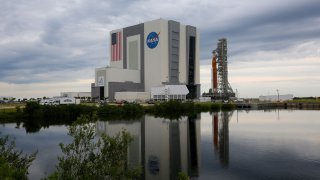
- With Hurricane Ian bearing down on Florida, NASA rolled back the Space Launch System (SLS) rocket — set to launch the Artemis I mission — into the mammoth Vehicle Assembly Building for protection at Kennedy Space Center.
- NASA now sees November as the most likely opportunity for the next Artemis I launch attempt.
- NASA associate administrator Jim Free said the agency expects to conduct work on the rocket while it's in the VAB, replacing "limited life" components.
NASA's long-awaited return to the moon is going to be delayed a little longer.
With Hurricane Ian bearing down on Florida, the space agency rolled back the Space Launch System (SLS) rocket — set to launch the Artemis I mission — into the mammoth Vehicle Assembly Building for protection at Kennedy Space Center.
The towering rocket, with the Orion capsule stacked on top of it, has been out on the launch pad since mid-August. Multiple technical problems have forced NASA to call off launch attempts over the past month.
We've got the news you need to know to start your day. Sign up for the First & 4Most morning newsletter — delivered to your inbox daily. >Sign up here.
NASA now sees November as the most likely opportunity for the next Artemis I launch attempt. In a press briefing on Tuesday, NASA associate administrator Jim Free said the agency expects to conduct work on the rocket while it's in the VAB, replacing components that are "limited life items."
"It's just a challenge to think: 'Can we get in there, [complete the work], and get back out there for another launch attempt,'" Free said. "We don't want to go out too fast and then we're stuck in a situation where maybe we didn't get to all the limited life items we want to."
For the rocket and capsule, "limited life" describes items which need to be refreshed or checked periodically, such as batteries or propellant tanks.
Money Report
The Artemis I mission would mark the debut of the SLS and Orion capsule, for what would be a more than monthlong journey around the moon. It kicks off NASA's long-awaited return to the moon's surface, the first mission in the Artemis lunar program. Tentatively, the plan is to land the agency's astronauts on the moon by its third Artemis mission in 2025.
Notably, this first mission is five years behind schedule and billions over budget. More than $40 billion has already been spent on the Artemis program, much of that toward SLS and Orion development. The system comes with a per-launch price tag of $4.1 billion.






